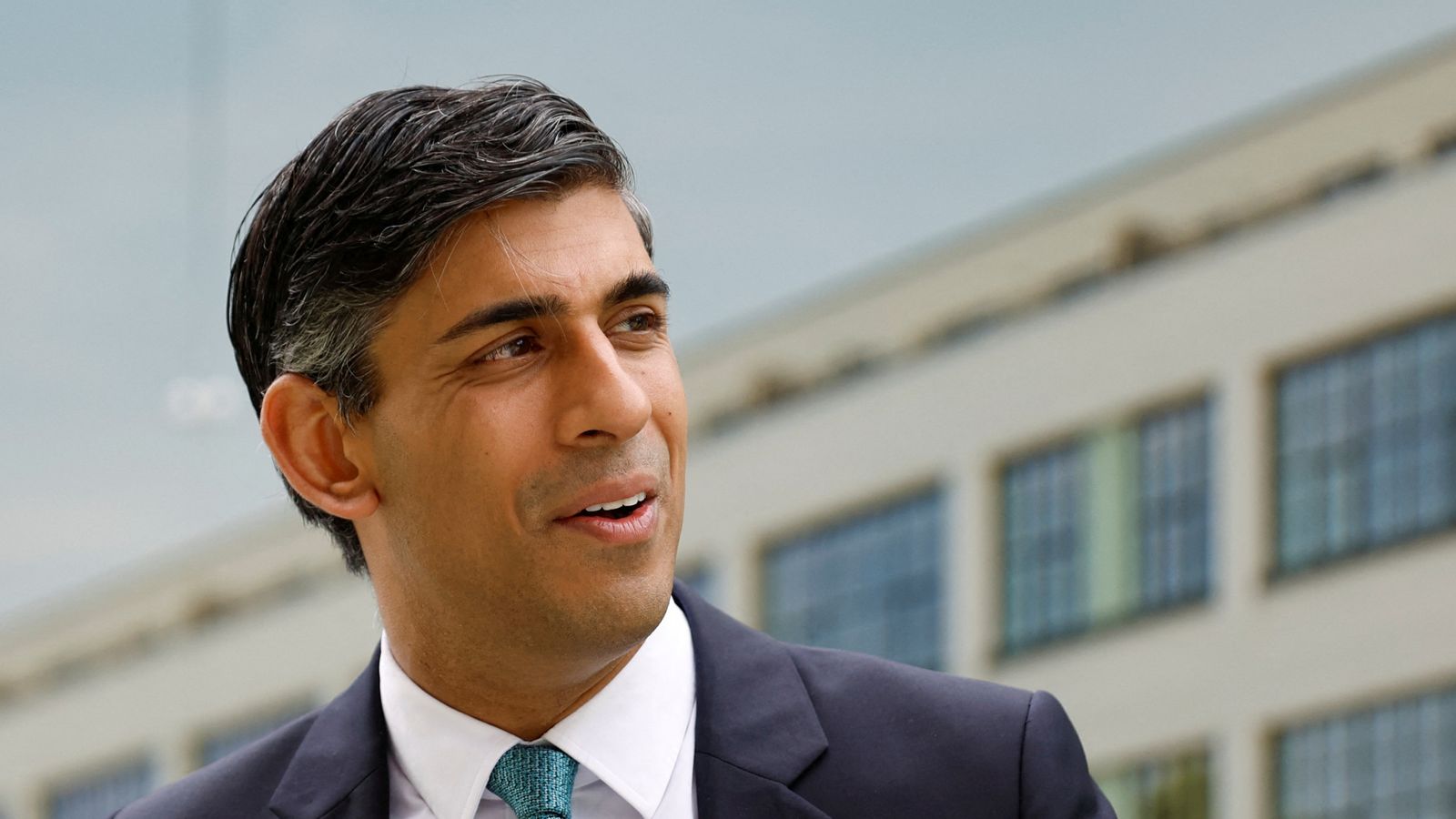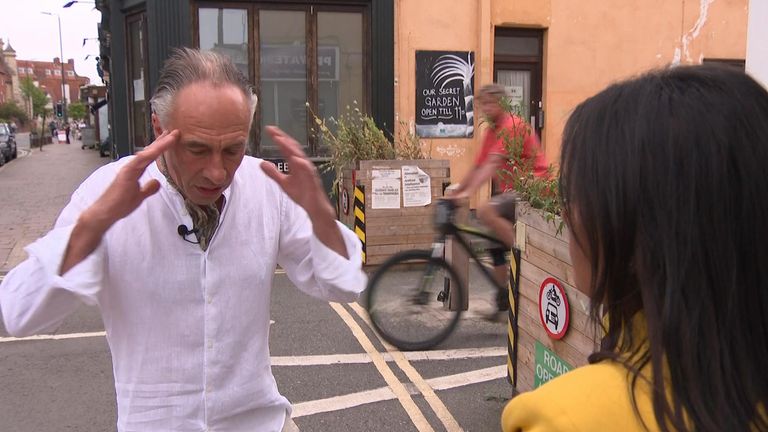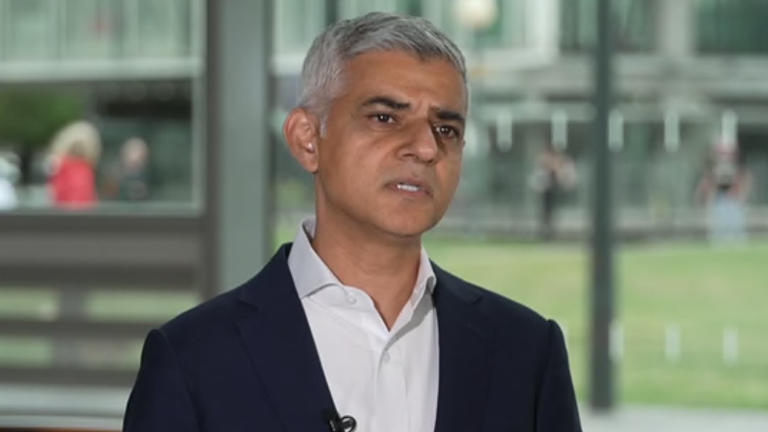Rishi Sunak orders review of low traffic neighbourhoods and says he’s on the side of motorists


Rishi Sunak has ordered a review into the rollout of low traffic neighbourhoods (LTNs), saying he is on the side of drivers.
The prime minister said in an interview with the Sunday Telegraph he had ordered the Department for Transport to look again at LTN policies, which aim to make residential areas cleaner and safer places for pedestrians.
Labour also accused the PM of reversing the Conservatives’ own acceleration of LTNs across the country, and said it should be for local communities to decide.
Read more:
What are the Conservatives’ green policies – and what could be scrapped?
The party’s shadow international trade secretary, Nick Thomas-Symonds, told Sky News it was “staggering” Mr Sunak was pitching himself as a friend of motorists, adding it was “yet another press release” policy from the PM.
Mr Sunak told the newspaper: “The vast majority of people in the country use their cars to get around and are dependent on their cars. When I’m lucky enough to get home to North Yorkshire it’s more representative of how most of the country is living, where cars are important.
“I just want to make sure people know that I’m on their side in supporting them to use their cars to do all the things that matter to them.”
Please use Chrome browser for a more accessible video player
1:43
Florence Pugh’s restauranteur dad fumes at low traffic neighbourhood.
Tory green policy review
Mr Sunak’s appeal to motorists and car owners comes after the Conservatives’ narrow victory in the Uxbridge and Ruislip by-election earlier this month, which saw the Tory candidate tap into local concerns about the expansion of London’s ultra-low emissions zone (ULEZ).
Advertisement
That success has seen some on the right of the party urge the PM to rethink net zero, amid hopes of attacking Labour’s green ambitions – though others have pleaded with him to stay on track.
In a letter published today, 43 Conservative MPs and peers called on Mr Sunak to delay the ban on the sale of petrol and diesel cars from the current deadline of 2030 to 2035.
The politicians – including former minister Sir Jacob-Rees Mogg and ex-party leader Sir Iain Duncan Smith – called the policy “heavy handed”, and claimed it would do “grave harm to the economy”.
The prime minister has insisted he will stick to the 2030 cut-off. But Downing Street confirmed last week that ministers were scrutinising existing pledges “in light of some of the cost of living challenges”.

Political correspondent
In terms of political objectives, there are similarities between the prime minister’s comments on LTNs and his rumoured focus on North Sea oil and gas.
These are both policy areas where Number 10 believes they can put distance between their approach and Labour’s – and in doing so, open up fronts to attack the opposition on.
Launching a review of so-called “anti-car schemes” is an attempt to replicate the electoral success achieved in the Uxbridge by-election on the back of anger against the Labour mayor’s expansion of the Ultra Low Emission Zone.
LTNs tend to be in areas run by Labour at a council level, meaning – as was the case in Uxbridge – the government can essentially be the opposition attacking the incumbent’s policies.
The national Labour position is also more caveated, with the party saying they are in favour of the “well planned” LTNs, but that decision must be made by local communities.
The party politics isn’t really that straight forward though.
For a start, when Boris Johnson was prime minister, his “net zero strategy” committed to more LTNs.
It’s also unclear if railing against LTNs is a nailed on vote winner.
Results from local elections – where traffic schemes often become big political issues in certain areas – present a mixed picture of how popular they are, with pro-LTN politicians frequently winning over candidates standing on a more critical platform.
There’s a similar health warning on oil and gas.
While an indication from Labour that it would ban new North Sea exploration ruffled some feathers, polling suggests people are generally in favour of moves towards decarbonising and reaching net zero.
Overall, even if the Tories can pick up some votes fighting on a pro-car and pro-oil front, it’s an open question whether they are big enough issues to bring about widespread gains come a general election.
The LTN debate
Under LTNs, local councils attempt to limit traffic in town and city centres – with drivers often prevented from using quiet residential roads as through-routes and it also encourages the uptake of other modes of transport.
However, opponents of the scheme say it has created hotspots of traffic which means people end up spending more time in their car.
Please use Chrome browser for a more accessible video player

1:29
ULEZ ‘landmark decision is good news’
The adoption of LTN policies has angered some Tory MPs who have criticised the measures as attacks on motorists and in recent months, it has emerged as a concern among some on the right of the Conservative Party.
Conservative MP Nick Fletcher suggested in the Commons earlier this year that traffic control plans being mooted by local councils across the UK were part of an “international socialist concept” which would take away personal liberties.
Mr Thomas-Symonds told Sky News his party was “in favour of well planned low traffic neighbourhoods”, but added: “They have to be decisions that are made by local communities.
“There are local communities around the country that actually want to reduce traffic in their neighbourhoods, want to push to have a low traffic neighbourhood. There are other areas where local concerns would need to be taken into account.”
Read more:
LTNs are about ‘taking back control’ from Whitehall
Starmer told to ‘get off the fence’ and challenge Sadiq Khan on ULEZ
‘Empty words’
Taking aim at Mr Sunak, the shadow minister said: “I have to say, I’ve seen some coverage this morning that the prime minister is posing as the friend of motorists, which I just find staggering.
“This is the prime minister who personally cut the potholes budget to such an extent that the money could have filled eight million potholes from Land’s End to John O’Groats and back again.
“This is the prime minister when there were petrol retailers not passing on falls in prices to consumers, who refused to put anything mandatory in place.
“As ever, I think with this government you have to judge them by their actions and not by yet more empty words.”
Please use Chrome browser for a more accessible video player
1:43
Florence Pugh’s restauranteur dad fumes at low traffic neighbourhood.
The Local Government Association (LGA) said a nationwide review was “unnecessary”, and councils were “best placed to make decisions”.
Spokesperson Linda Taylor, said: “It is important that we consult with all residents and businesses to find the best solutions to ease congestion and improve air quality for everyone.
“However, it is councils who are best placed to make decisions with their communities in improving the lives of people and businesses.
“As democratic organisations they continually review all kinds of services and schemes based on local circumstances. Therefore, a national review is unnecessary.”